An IV home service brings professional intravenous (IV) therapy directly to your doorstep, administered by a licensed and experienced medical professional. This service allows patients to receive essential treatments like hydration, antibiotics, and nutritional support without leaving the comfort and safety of their homes, seamlessly blending clinical care with familiar surroundings.
What Exactly Is an IV Home Service?
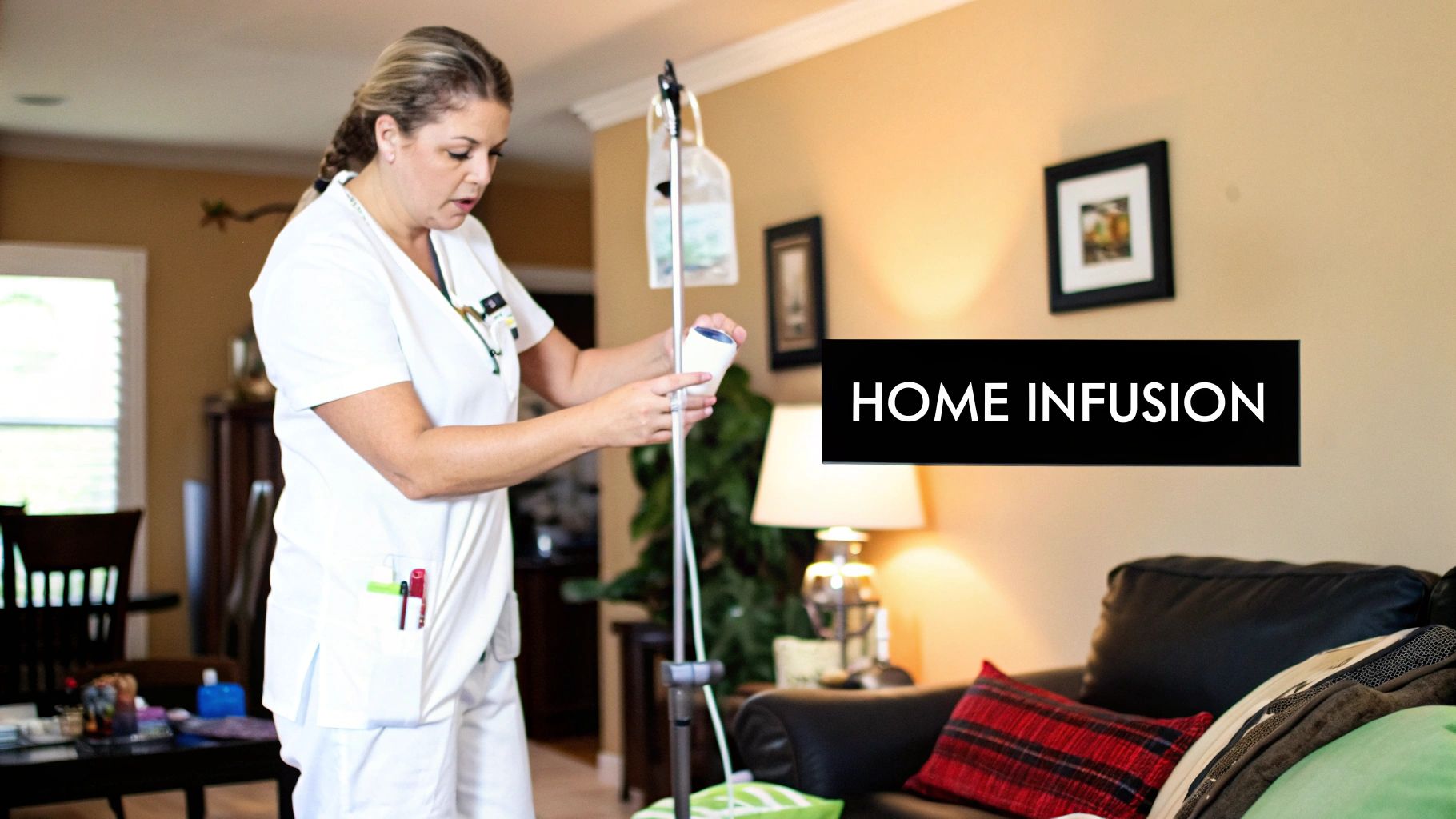
Think of an IV home service as your personal, mobile medical unit. Instead of dealing with the hassle of traffic, parking, and long waits in a clinic, a qualified nurse comes directly to you with all the necessary sterile equipment and prescribed treatments. This innovative approach transforms your living room into a private, comfortable, and safe space for receiving essential medical care.
This service is more than a simple convenience—it’s a fundamental shift in healthcare delivery. It bridges the gap between requiring hospital-level treatment and the desire to recover in a supportive, familiar environment. The entire process is managed by medical experts, from the initial doctor’s prescription to the final treatment administered by a certified nurse, ensuring a seamless experience.
From Prescription to Treatment
The journey begins when your doctor determines that intravenous therapy is the best course of action for your health. They will write a prescription and refer you to a trusted home healthcare provider. From there, the provider handles everything. They coordinate the right medications, prepare all necessary supplies, and schedule a nurse to visit you at a time that works for you.
This process removes a significant logistical burden. You and your family don't have to worry about scheduling multiple trips to a clinic; you simply arrange an appointment that fits your life.
Common Therapies Administered at Home
The range of an IV home service is surprisingly broad, extending well beyond simple wellness drips. A skilled nurse can manage a wide variety of clinical treatments right in your home. Some of the most common therapies include:
- Antibiotic and Antiviral Infusions: Ideal for patients who are stable enough to leave the hospital but still require IV medication to recover from serious infections.
- Nutritional Support: For individuals who cannot properly absorb nutrients through their digestive system, IV therapy can deliver essential vitamins and minerals directly into the bloodstream.
- Hydration Therapy: A fast and effective way to restore fluids and electrolytes for people dealing with dehydration from illness or other conditions. Learn more by reading our guide on getting a hydration drip at home.
- Pain Management: Under strict medical supervision, nurses can administer medications to help manage chronic or acute pain, providing relief without a hospital stay.
The core principle of an IV home service is to make advanced medical care more accessible and less disruptive. By bringing the clinic to you, it reduces stress, minimizes the risk of exposure to other illnesses, and provides a personalized, one-on-one care experience that is difficult to achieve in a busy hospital setting. It’s an approach that prioritizes both clinical outcomes and your personal well-being.
The Real Benefits of Choosing At-Home IV Therapy

While the convenience of an IV home service is a significant advantage, its true value runs much deeper. This is not just about avoiding a trip to the clinic; it represents a patient-centric shift that offers tangible benefits, genuinely improving the healing process and overall quality of life.
Receiving treatment at home means you can avoid the sterile and often stressful hospital environment. Instead, you are in your own bed, surrounded by the comforts of home and the support of your family. This peaceful setting can make a world of difference, reducing stress and allowing your body to focus its energy on recovery.
Minimising Health Risks
One of the most critical advantages is avoiding hospital-acquired infections (HAIs). Hospitals, by their nature, are environments where germs can concentrate, posing a real risk, especially for individuals with compromised immune systems. An IV home service creates a protective bubble, limiting your exposure to pathogens and making your recovery journey safer.
This is particularly important for patients requiring long-term treatments, such as extended courses of antibiotics. Every hospital visit you avoid adds another layer of security for your health. For those exploring wellness options, you can discover the benefits of a vitamin drip in Dubai administered in a completely controlled and safe home setting.
Gaining Personalised, Undivided Attention
In a busy hospital ward, nurses and doctors are often stretched thin, managing the needs of multiple patients simultaneously. An IV home service completely changes this dynamic. When a nurse comes to your home, their focus is 100% on you.
This one-on-one care ensures your treatment is administered with the utmost precision. It also provides the perfect opportunity to ask questions and receive clear, unhurried answers about your therapy. This personalized interaction builds trust and fosters a stronger therapeutic relationship.
At its core, at-home IV therapy prioritises your comfort, safety, and individual needs. It delivers high-quality medical care without the institutional feel, allowing you to heal on your own terms in the place you feel most secure.
It's no surprise that this patient-first model is gaining traction. The home healthcare market in the Middle East and Africa is booming, valued at approximately USD 19.2 billion and projected to reach USD 37.56 billion by 2033. This growth is driven by people demanding the comfort and quality of life that only home-based medical care can provide.
Who Is an Ideal Candidate for Home Infusion Therapy?
While an IV home service offers incredible convenience, it’s not suitable for every medical situation. Identifying the ideal candidate is key to ensuring treatment is both safe and effective. The best candidates are typically patients who are medically stable but require ongoing IV therapy without needing 24/7 hospital supervision.
The hospital is for acute, critical conditions, while home infusion therapy is designed for stable, continuing care. This service is intended for individuals with a clear diagnosis, a treatment plan prescribed by their doctor, and a safe home environment. The first and most crucial step is always a doctor's referral, which confirms that at-home care is the right clinical choice.
Patients Who Benefit Most
Certain patient groups find at-home IV therapy to be a game-changer. Their conditions often require consistent treatment over days or weeks, making daily hospital visits impractical and disruptive.
Key profiles include:
- Individuals with Chronic Conditions: Patients managing long-term illnesses like immune deficiencies often need regular infusions. Home therapy allows them to adhere to their treatment schedule without interrupting their life.
- Post-Surgery Patients: After an operation, many are well enough to go home but still need IV antibiotics to prevent infection. An IV home service enables them to recover in the comfort of their own bed.
- Oncology Patients: Some cancer treatments, like certain chemotherapies or hydration therapy, can be safely administered at home, reducing the physical and emotional toll of frequent trips to a cancer center.
Common Conditions Treated with IV Home Service
To provide a clearer picture, here are some common scenarios where at-home IV therapy is used. This list covers many of the primary reasons people choose this service.
| Condition Category | Specific Examples | Common IV Treatment |
|---|---|---|
| Infections | Pneumonia, cellulitis, post-surgical infections | Antibiotics, Antivirals, Antifungals |
| Dehydration | Severe vomiting, diarrhea, post-illness recovery | IV Fluids (Saline), Electrolytes |
| Nutritional Support | Crohn's disease, malabsorption syndromes | Total Parenteral Nutrition (TPN) |
| Immune Disorders | Primary immunodeficiency, multiple sclerosis (MS) | Intravenous Immunoglobulin (IVIG) |
| Pain Management | Chronic pain, post-operative pain | Analgesics (Pain Relievers) |
| Oncology Support | Side effects of chemotherapy | Hydration, Anti-nausea Medications |
These examples demonstrate the versatility of at-home infusions, providing targeted medical care where patients feel most comfortable.
The Essential Safety Assessment
Before any medication is administered, a home healthcare agency conducts a thorough assessment of the home. This is a critical step to guarantee patient safety and care quality. A qualified professional will evaluate the home to ensure it is a proper setting for medical procedures.
The core principle is simple: a patient's home must be a safe and supportive environment for recovery. The assessment confirms there is adequate space, proper hygiene, and the necessary infrastructure (like electricity) to support medical equipment.
This careful qualification process ensures every patient receiving an IV home service is set up for success from the start. The goal is to deliver hospital-level care with the personal touch of dedicated professionals. To learn more about these skilled experts, you can explore the different types of nursing services at home available.
The Expanding World of At-Home Infusion Treatments
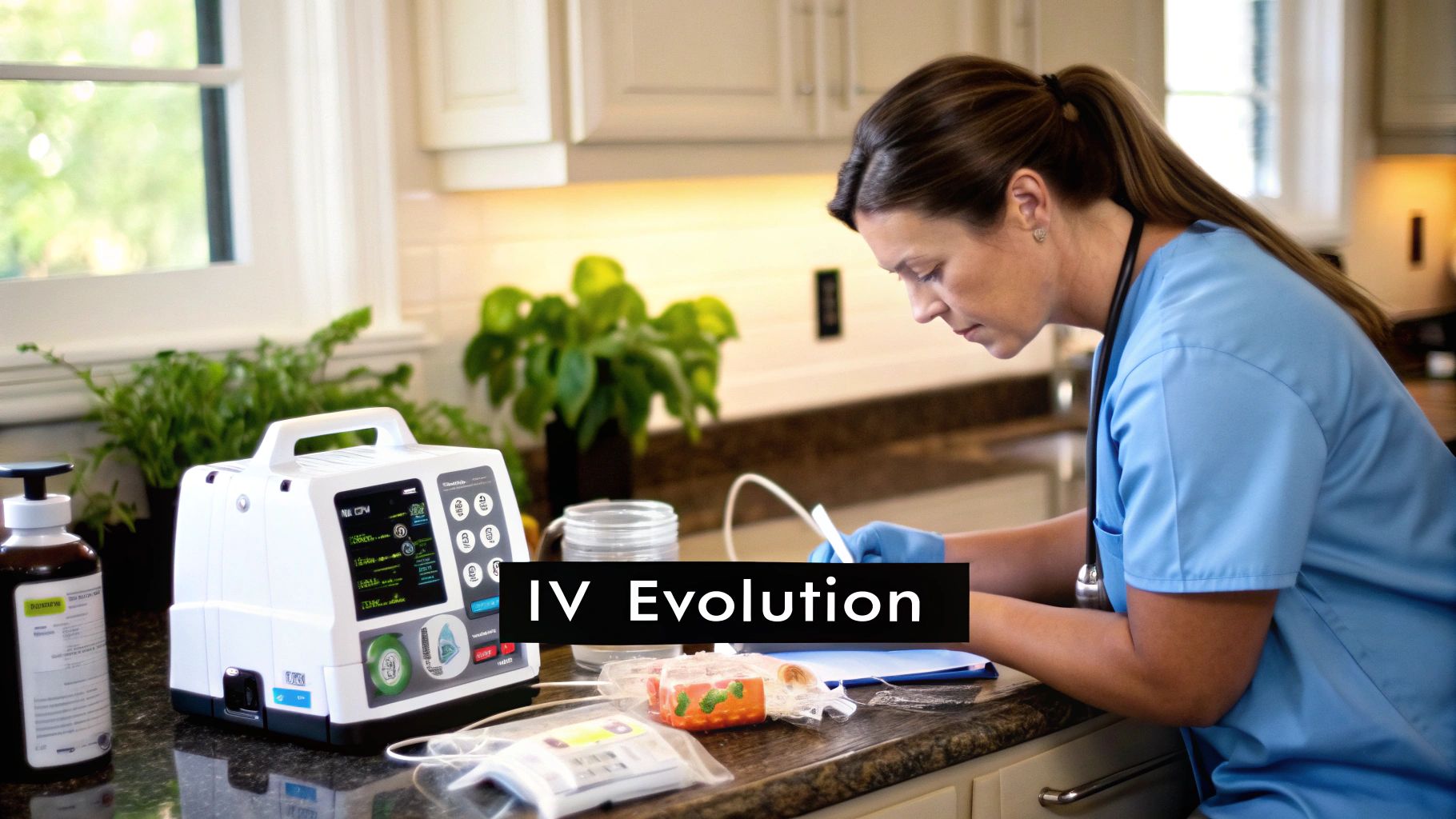
Not long ago, the phrase "IV home service" might have brought to mind a simple saline drip or a standard course of antibiotics. That picture has completely changed. Thanks to advancements in medical technology and the specialized training of homecare nurses, your living room can now function as a safe and effective clinical space for surprisingly complex treatments.
What was once confined to a hospital is now routinely and safely performed at home. This represents a significant step forward in patient-centered care, making long-term therapies far more manageable and less disruptive to daily life.
More Than Just Hydration and Antibiotics
The scope of at-home IV therapy has grown far beyond the basics. We can now administer treatments that require incredible precision and close monitoring from the comfort of home, made possible by portable infusion pumps, strict safety protocols, and the fact that people often heal better in familiar surroundings.
Some advanced therapies now common at home include:
- Complex Anti-Infectives: For serious infections requiring powerful, long-term antimicrobial drugs.
- Parenteral Nutrition: A lifeline for patients unable to absorb nutrients through their digestive system.
- Specialized Biologics: Targeted treatments for autoimmune conditions like Crohn's disease.
- Certain Chemotherapies: Some low-risk chemotherapy regimens can be managed at home, easing the burden of constant hospital visits.
This trend is also visible in the wellness space, with more people seeking services like a specialized vitamin infusion at home to proactively support their health.
A Growing Market That Reflects Patient Demand
The demand for more convenient healthcare is clear, and the home infusion market is booming as a result. In the Middle East and Africa, the home infusion therapy market was valued at approximately US$ 1.28 billion and is expected to reach nearly US$ 1.99 billion by 2028. This surge is partly due to the growing need for at-home oncology and hematology treatments, showing how much critical care is shifting from hospital to home.
This isn't just about convenience—it's a fundamental shift in healthcare delivery. By bringing advanced treatments into the home, an IV home service empowers patients, improves their quality of life, and cements its place as an essential part of modern medicine.
How Providers Ensure Safety and Quality of Care
When you invite a medical professional into your home, trust is paramount. Reputable providers of IV home service understand this and build their operations around rigorous safety protocols and the highest quality standards. The goal is simple: to ensure the care you receive at home is just as safe and effective as what you would get in a hospital.
From the moment your treatment is prescribed, a dedicated team and a multi-layered system of checks and balances swing into action to manage every detail meticulously.
The Highly Skilled Infusion Nurse
The nurse who arrives at your door is the face of your care, and their expertise is non-negotiable. These are not general nurses; they are specialists with extensive training and experience in infusion therapy. Their skills go far beyond simply starting an IV.
They are experts in:
- Aseptic Technique: Creating and maintaining a sterile environment to eliminate infection risk.
- Medication Administration: Accurately calculating dosages and infusion rates to match your doctor's orders perfectly.
- Adverse Reaction Management: Quickly identifying and responding to potential side effects or complications, following clear emergency protocols.
These nurses are also great educators, teaching you and your family how to care for the infusion site and what warning signs to watch for. To learn more about the incredible professionals providing this level of care, check out our article on home nurses in Dubai.
Behind the Scenes Clinical Excellence
Long before a nurse arrives, a clinical pharmacist plays a critical role. These experts prepare your sterile IV solutions in a controlled cleanroom environment, ensuring every dose is contaminant-free and mixed according to strict pharmaceutical guidelines. They also review your overall medication plan to prevent any harmful drug interactions.
Quality of care in a home setting is never a coincidence. It is the direct result of having clearly defined standards, highly trained staff, and a constant focus on patient safety from every member of the medical team.
This commitment to quality is also reflected in the equipment used, such as smart infusion pumps programmed to deliver medication at a precise rate, which dramatically reduces the chance of human error.
The quality of IV solutions is another crucial piece of the puzzle. The intravenous solutions market in the Middle East and Africa is a massive industry—valued at around USD 1.03 billion—and it's expected to nearly double. This growth directly supports the expanding IV home service sector by guaranteeing a steady supply of top-tier medical fluids. You can find more insights about this growing market on marketresearch.com. This robust infrastructure ensures providers have access to the best resources to deliver safe, effective care to your doorstep.
Your Step-by-Step Guide to Getting Started with an IV Home Service
Considering an IV home service might seem daunting at first, but the process is structured and straightforward, with your safety and medical needs as the top priority. Let's break it down into a simple, clear journey.
Everything begins with a conversation with your primary doctor or a specialist. They will assess your health situation and determine if receiving infusion therapy at home is a safe and appropriate choice for you.
Securing Your Doctor Referral
Your doctor is your primary partner in this process. If they determine you are a suitable candidate for at-home IV therapy, they will write a formal referral and a prescription. This official order is what enables you to connect with a licensed IV home service provider.
This referral is more than just permission; it's a detailed roadmap for your care. It specifies the medication you need, the correct dosage, the frequency of administration, and the duration of the treatment.
Think of your doctor's referral as the architectural blueprint for your entire care plan. It ensures the treatment you receive at home aligns perfectly with your medical team's recommendations for achieving your health goals.
The infographic below illustrates the process from initial referral to your first treatment at home.
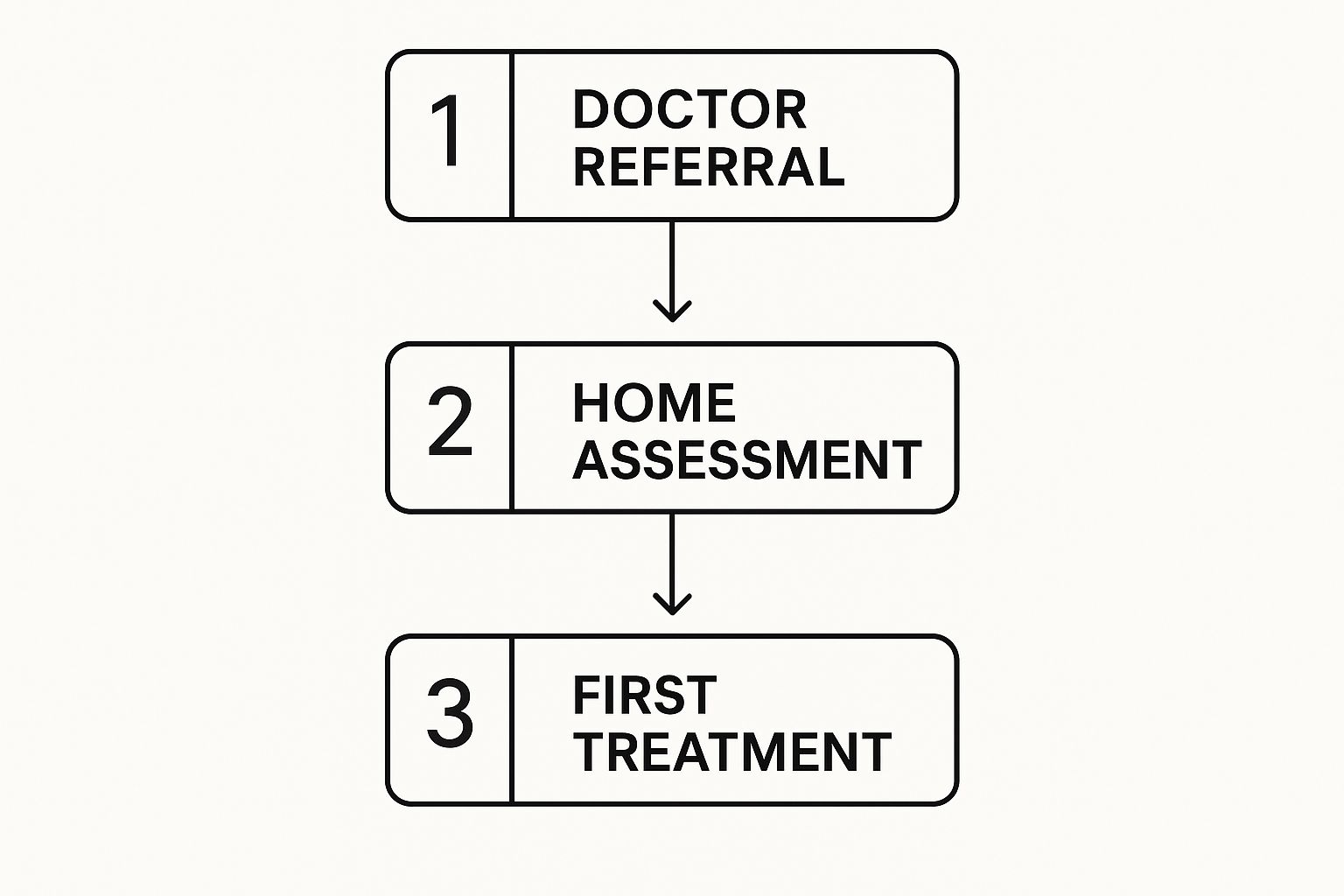
As you can see, it's a logical path that starts with medical approval and ends with personalized care delivered right to your door.
The Home Assessment and Care Plan
Once you have chosen a provider and they have received your referral, they will schedule a home assessment. A registered nurse will visit to ensure your home is a suitable environment for medical care. They will check for basics like a clean space, access to an electrical outlet, and a safe area to set up the equipment.
Following this visit, the clinical team will create a personalized care plan based on your doctor’s orders. This plan covers everything from your treatment schedule to emergency protocols. Finally, you will book your first appointment, and a skilled infusion nurse will come to your home to begin your treatment, guiding you through every step.
Common Questions About IV Home Service
It’s completely normal to have questions when considering medical care at home. To help put your mind at ease, here are straightforward answers to the most frequently asked questions about our IV home service.
Is At-Home IV Therapy Covered by Insurance?
This is a common and important question. Coverage depends on your specific insurance plan and the medical reason for the treatment. Many insurance providers cover home infusion therapy when it is medically necessary and ordered by a doctor—such as for post-hospitalization antibiotics or critical hydration.
However, wellness-focused therapies like vitamin drips are typically not covered and are considered out-of-pocket expenses.
To get a clear answer:
- Contact your insurance provider directly to review your specific benefits.
- Allow our administrative team to assist. We have experience navigating insurance and can help verify your coverage.
What Happens if There’s an Emergency During My Treatment?
Your safety is our absolute top priority. Every one of our infusion nurses is a licensed professional extensively trained to handle potential side effects or adverse reactions, from mild to severe. They operate under strict emergency protocols designed by our medical directors and your physician.
In the rare event of a severe reaction, the nurse is fully prepared to provide immediate intervention and will contact emergency services without delay. You are never alone and are always in capable hands.
When it comes to your health, choosing the right provider is everything. A good agency will be transparent about their credentials, staff qualifications, and safety procedures. That transparency provides true peace of mind.
Before you commit, look for proper licensing, check patient reviews, and ask about the team. A trustworthy provider will have qualified nurses and clinical pharmacists overseeing every treatment plan, ensuring you receive care that meets the highest medical standards.
For professional, safe, and reliable medical care right in your own home, you can count on Call To Doctor. Our team of DHA-licensed doctors and nurses is on call 24/7 to provide a wide range of services, including expert IV home service. Find out more about how we put your health first at https://calltodoctor.ae.
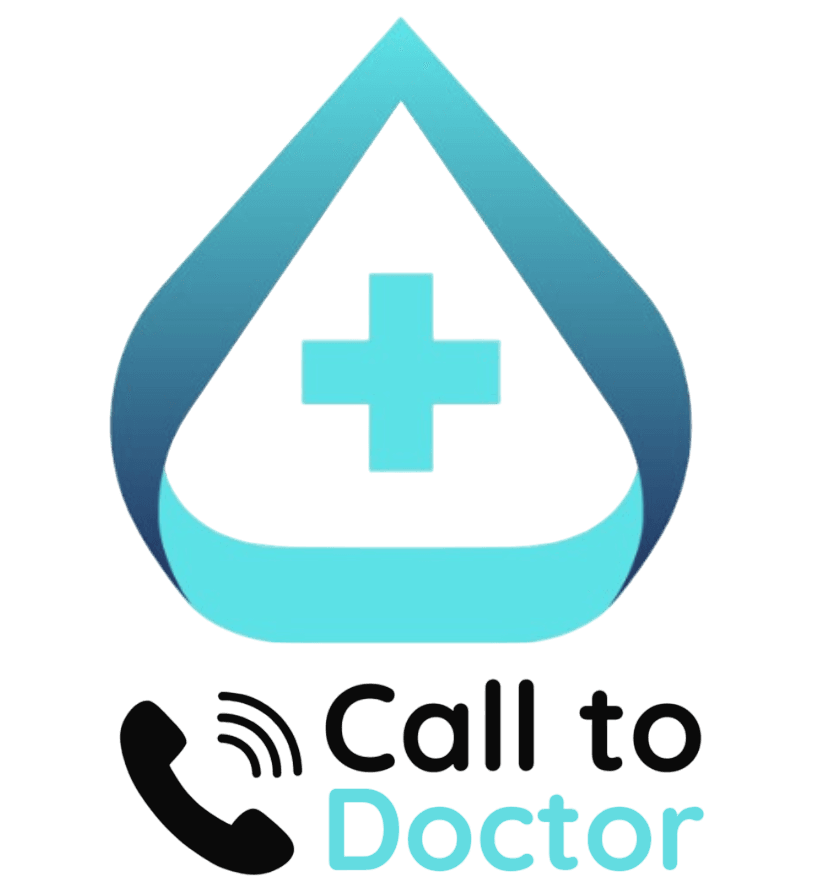

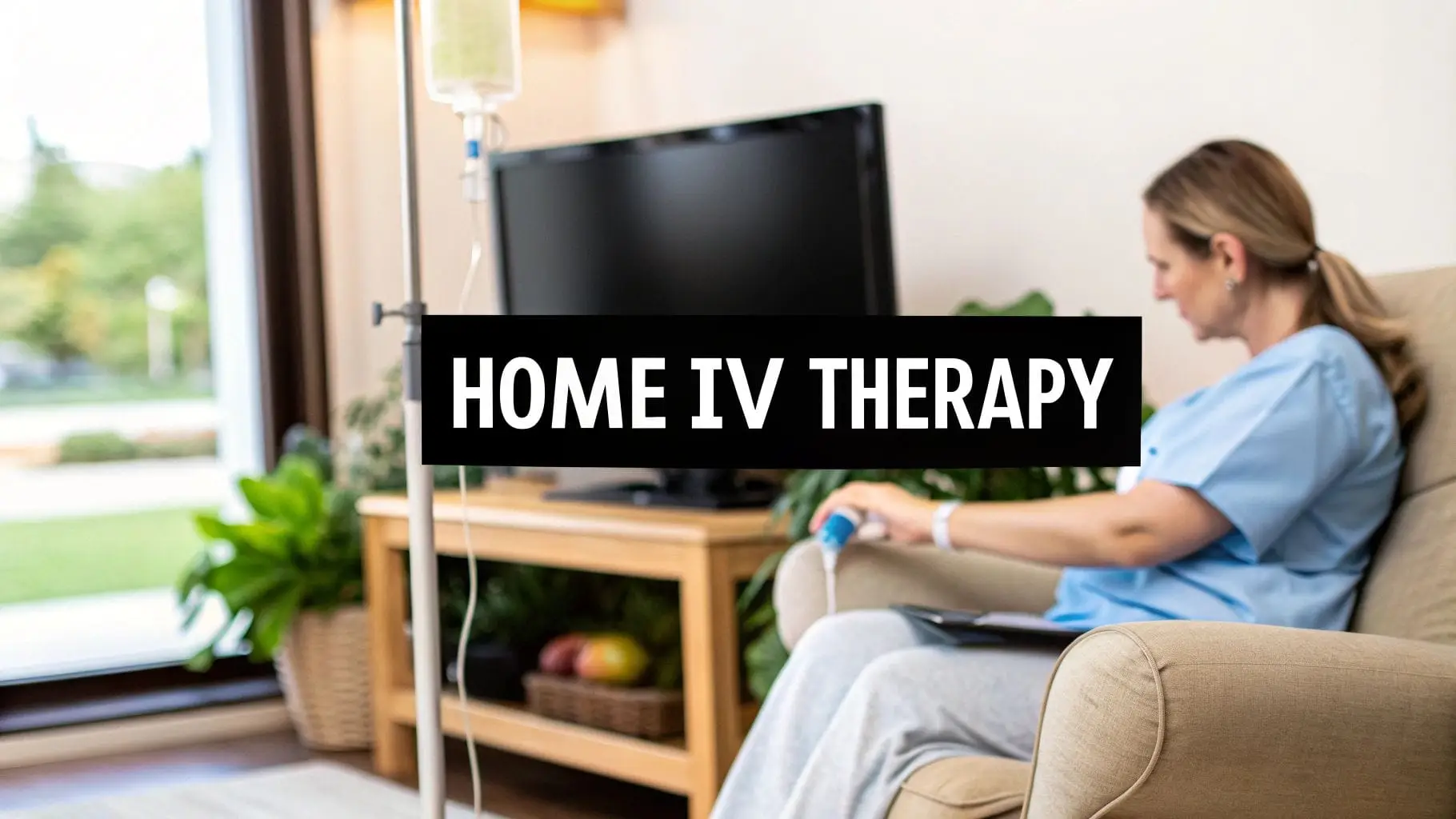
Leave a Reply